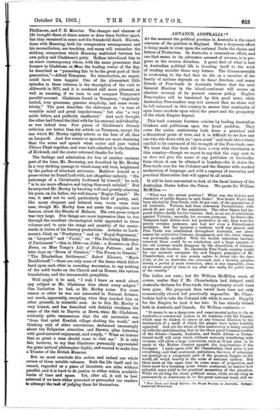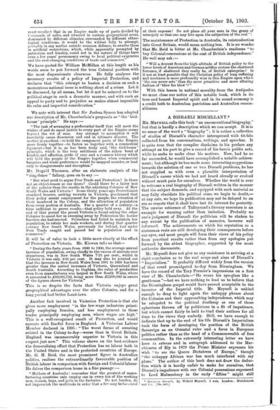ADVANCE, AUSTRALIA. !*
AT the moment the political position in Australia is the exact
converse of the position in England. Here a desperate effort is being made to rivet upon the national limbs the chains and fetters of Protection. In Australia a. tremendous effort, and one that seems to its advocates assured of success, is in pro- gress in the reverse direction. A great deal of what is best in Australian political life is devoting itself to the work of rending asunder these very fetters. The Commonwealth is awakening to the fact that its life as a member of the family of nations depends on its fiscal freedom, and many friends of Free-trade in Australia believe that the next General Election in the island-continent will secure an absolute reversal of its present ruinous policy. English Free-traders will be heartened by this good news, while Australian Free-traders may rest assured that no stone will be left unturned in this country to secure that continuity of open home markets upon which the peace and the prosperity of the whole Empire depend.
This book contains fourteen articles by leading Australian thinkers and politicians upon the fiscal problem. They cover the entire controversy both from a practical and a theoretical point of view, and it is difficult to see how any one who sits down with an" open mind" and reads this volume can fail to be convinced of the strength of the Free-trade case. We trust that this book will have a very wide circulation in this country—though we regret to say that the copy sent to us does not give the name of any publisher or bookseller from whom it can be obtained in London—for it states the Free-trade case for the Colonies and the Empire with marked moderation of language, and with a cogency of reasoning and practical illustration that will appeal to all minds.
It will be here convenient to look at the fiscal history of the Australian States before the Union. We quote Sir William McMillan :—
"What was the actual position ? What was the history and character of public finance in each State ? New South Wales had been absolutely Free Trade, with 36 per cent, of the population of all Australia. Victoria had been extremely Protectionist, with about 33 per cent. of the population. The other States had im- posed duties chiefly for two reasons : first, as an act of retaliation against Victoria ; secondly, for revenue purposes. In States like Tasmania high duties were not protective at all ; they were for purely revenue purposes, and had not even a Protectionist incidence. But the moment a uniform tariff was passed, and Free Trade was established throughout Australia, one great reason for restrictive Customs disappeared, and the other reason was profoundly modified. With the foolish interstate barriers removed, there could be no retaliation, and a large amount of the old revenue would disappear by the demolition of Custom- houses on the borders. No absolutely Free Trade country would for one moment recognise the new Empire principles of Mr. Chamberlain, and it was grossly unfair to thrust into the fore- front, as far as Australia was concerned, such a burning question during a period of acute transition, when it was impossible, from an economic point of view, to say what was really the public sense of the country."
The italics are ours ; but Sir William McMillan must, of course, realise that if Mr. Chamberlain had delayed until Australia declares for Free-trade, his opportunity would have been gone. His proposals then would have been not only economically absurd, but practically impossible. Mr. Cham- berlain had to take the Colonial tide while it served. Happily for the Empire, he took it too late. It has already turned both in Australia and Canada. Sir William continues :—
"It seems to me a. dangerous and experimental policy to fir on Australia a commercial system in its relations with the Empire, which may be shaken to pieces at any General Election by the destruction of a tariff of which the people have never heartily approved. And yet the whole of this controversy is being carried on with the understanding that in the three great Commonwealths of the future—Canada, Australia, and South Africa—a Protec- tionist tariff will exist which, without seriously interfering with revenue, will allow a large concession, such as 33 per cent., to be made to the Mother Country against the importations of the foreigner. I quite agree with Mr. Chamberlain that price is not everything, and that sentiment, patriotism, the love of retaining our prestige as a component part of the greatest Empire in the world, all weigh heavily in the scale of national opinion. But there must at the same time be some sense of proportion, and there must be a breaking point where sentiment, no matter how splendid, must yield to the practical necessities of the situation. While we all long for closer political union, while we all cling as passionately as Americans do to the great national bond, still we • Free Trade and Tariff Reform: the Fiscal Position in Australia. Sydney: Angus and Robertson.
must recollect that in an Empire made up of parts divided by thousands of miles, and situated in various geographical areas, dominated by different climates, surrounded by different ethno- logical conditions, it would be the wildest folly to attempt, probably in any matter outside common defence, to swathe them in artificial restrictions, which, while apparently prompted by patriotism and kinship, could not in the nature of things have even a few years' permanency owing to local political exigencies and the ever-changing conditions of trade and commerce."
We have quoted Sir William McMillan at this length as his words seem to put forward the true Colonial position with the most dispassionate clearness. He fully analyses the necessary results of a policy of Imperial Protection, and declares that "this attempt to hasten a decision on such a momentous national issue is nothing short of a crime. Let it be discussed, by all means, but let it not be ushered on to the political stage in such a dramatic manner, and with such an appeal to party and to prejudice as makes almost impossible its calm and impartial consideration."
We note with interest that Sir Joshua Symon has adopted our description of Mr. Chamberlain's proposals as "the 'tied- house' principle." He says :—
"The task of arranging a preferential tariff that will meet the wishes of and do equal justice to every part of the Empire seems beyond the wit of man. Any attempt to accomplish it will inevitably cause dissension and end in ultimate disaster. The motive is excellent—to hold the component parts of the Empire more firmly together—to fasten us together with a commercial ligament—but it is, as has been truly said, 'the tied-house' principle, which is the very antithesis of the silken bond of kinship and affection, pride of race and a common history which will hold the people of the Empire together when commercial bargains and trade preferences would be snapped asunder, or lead only to disagreements and disruption."
Mr. Dugald Thomson, after an elaborate analysis of the "ring-fence "fallacy, goes on to say :— "But what need to argue Free Trade and Protection ? Is there not an object-lesson at our doors? Could there be a fairer test of the policies than the results in the adjoining Colonies of New South Wales and Victoria ? Some thirty years ago Protectionist standard bearers, seeking recruits in Victoria, proclaimed that their policy meant employment for the people, the retention of their manhood in the Colony, and the attraction of population from every portion of Australia. For a quarter of a century—a time sufficient to prove results—that policy held sway. At the end of that period the proud Victoria is found asking the other Colonies to assist her in sweeping away by Federation the border barriers she had erected. Protection had failed to maintain her population, to retain her male workers, and during that quarter century New South Wales, previously far behind, had under Free Trade caught and passed her in population and in commerce."
It will be of value to look a little more closely at the effect of Protection on Victoria. Mr. Kirwan tells us that— "During the forty years from 1860 to 1900, the average annual increase of population, owing chiefly to the excess of arrivals over departures, was in New South Wales 725 per cent., whilst in Victoria it was only 3-05 per cent. It may also be pointed out that the increase in New South Wales from 1891 to 1900 has been greater than the united increases of Victoria, Queensland and South Australia. According to Coghlan, the value of production even from manufactures was largest in New South Wales, where it amounted to £10,081,750, being more than £2,600,000 in excess of the figures shown for Victoria."
This is so despite the facts that Victoria enjoys great geographical advantages over the other Colonies, and for a long period had better Land-laws.
Another fact involved in Victorian Protection is that she gives more employment "in the low-wage industries princi- pally employing females, and less employment in those trades principally employing men, where wages are high." This is a well-recognised result of Protection, and would operate with fearful force in England. A Victorian Labour Member declared in 1895: "The worst forms of sweating existed in the Colony to-day—worse than in Great Britain. England was immeasurably superior to Victoria in this respect just now." This volume shows on the best evidence the demoralising effect that Protection has on labour both in the United States and in the protected countries of Europe. Mr. G. H. Reid, the most prominent figure in Australian politics, realises the extraordinarily favourable position of British labour in comparison with foreign and Colonial labour. He drives the comparison home in a fine passage
Mothers of Australia! remember that the greatest of manu- facturing countries only employ one in every ten of the working men, women, boys, and girls in the factories. Do not burden, do not impoverish the multitude in order that a few may be favoured at their expense ! Do not place all your sons in the grasp of monopoly so that one may live upon the subjection of the rest" !
The maintenance of Protection in Australia, its reintroduction into Great Britain, would mean nothing less. It is no wonder
that Mr. Reid is bitter at Mr. Chamberlain's readiness "to buy Colonial concessions at the cost of British independence." He well may ask :—
"Will a descent from the high altitude of British policy to the lower levels of American and German artifice restore the shattered fortunes, if shattered they really be, of British enterprise ? Is it not at least possible that the Christian policy of long suffering and meekness is more profoundly wise in this Empire upon which 'the sun never sets' than the more primitive and more alluring fashion of blow for blow'?"
With this lesson in national morality from the Antipodes we must close our notice of this notable book, which in its true and honest Imperial spirit and in its sound economy is a credit both to Australian patriotism and Australian reason- ableness.























































 Previous page
Previous page